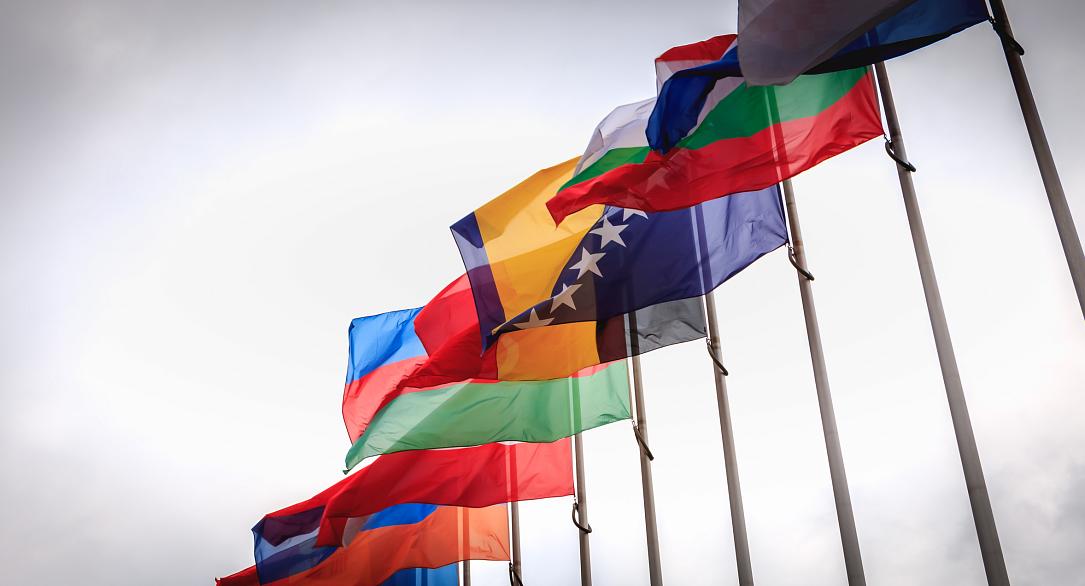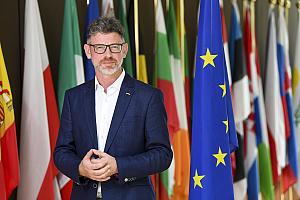Comment: May 9 - Europe Day and Victory Day, same date but two strikingly different celebrations

Romania Insider journalist Radu Dumitrescu looks into the historic symbolism of May 9 - a celebration of democracy for most of Europe and a display of authoritarian power for Russia. This year, the difference between the two celebrations is more striking than ever. But Romania also has its own celebration on May 9, one in which Russia also played a role.
For countries of the European Union, including Romania, May 9 is Europe Day, a celebration of the birth of the European Union, while for Russia and other former Soviet republics, the same date marks Victory Day, highlighting Russia’s defeat of Nazism.
On May 9, 1950, years after the end of the Second World War, French Foreign Minister Robert Schuman proposed the creation of the European Coal and Steel Community. The proposal was primarily directed at France and Germany, the largest countries on the continent and age-old rivals. One year later, the signing of the Treaty of Paris turned the proposal into reality.
The Community, meant to be a bulwark against war in Europe through the pooling of coal and steel, materials essential to making arms, was the precursor of the European Union. Marked by the horrors of the Second World War, Schuman specifically left the door open for other nations to join the Community and intertwine their economies with one another.
Thirty-five years after Schuman’s initial proposal, European heads of state and government decided to commemorate the event as the Community’s - and subsequently the EU’s - birth date, “Europe Day.”
For institutions of the European Union, May 9 is also an open doors day, an occasion for citizens to visit the European Parliament and other locations. However, as reporter Jorge Liboreiro points out for Euronews, among the countries of Europe, only Luxembourg and Kosovo - which is not part of the EU - established Europe day as a national holiday.
This year, Europe Day also marks the end of the Conference on the Future of Europe, launched in Strasbourg exactly one year prior. The Conference invited Europeans to come up with ideas for tackling the many challenges that the Union faces through a multilingual participatory platform. Numerous meetings, workshops, thematic panels, and plenary sessions between national and local European institutions also took place during the same event.
In Romania, May 9 also marks the end of the 1877 war of independence, remembered outside of the country as the Russo-Turkish war of 1877-1878. During the war, Romania fought on the side of Russia against the Ottoman Empire and obtained formal independence from the latter.
This year, Europe Day was celebrated through the European Film Festival in Râșnov, which ran between May 6 and May 9. Themes related to solidarity, inclusion, climate change, and other issues were tackled before a predominantly young audience. The My Future contest also challenged young people to think up ways to transform and modernize the Romanian city of Pitești.
The war in Ukraine gave a renewed meaning to Europe Day. “The Russian invasion of Ukraine reminds us why we are celebrating Europe Day,” European Commission president Ursula von der Leyen said. “The day when a peaceful, prosperous Europe was born. 72 years later, Europe is united in solidarity with our Ukrainian friends, who aspire to a future of freedom,” she concluded.
In Russia and other republics of the defunct Soviet Union, however, May 9 has its own meaning - Victory Day. It marks the Soviet Union’s victory over Nazi Germany in WW2, or the “Great Patriotic War.” Western European countries celebrate the defeat of Nazism one day earlier, 8 May, dubbing it Victory in Europe Day.
In Russia, the event is ostensibly about remembering the sacrifices made by Russians and other Eastern peoples for achieving victory - the USSR lost up to 27 million people during the war. Nowadays, the day is famously marked by a military parade of troops, tanks, and other equipment, through Moscow’s Red Square and other Russian cities. Roughly 14,000 troops and hundreds of vehicles, including those capable of carrying nuclear weapons, are passed today under the inspecting gaze of Vladimir Putin personally, in a show of strength before the world.
On the occasion of his Victory Speech of this year, the Russian president defended the invasion of Ukraine, falsely arguing that the West was "preparing for the invasion of Russia."
The military parade, however, is a relatively recent addition to Victory Day. A rare occurrence beforehand, it was revived in 1995 by Russian president Boris Yeltsin. The timing was not accidental. In the early to mid-’90s, Russia was teetering on the verge of economic collapse as it attempted to transition from the ineffective centralized, Soviet-era economic model to a modern market economy. The GDP dropped by one-sixth in the process, while the budget deficit and the inflation skyrocketed.
Finally in 1995, through loans from the IMF and the sale of oil and gas, Russia was able to stabilize and was therefore eager to reassert its power before the world and, perhaps more importantly, before its own citizens.
The Putin presidency exaggerated the importance of Victory Day, marking it yearly starting in 2008. Putin also cast Victory Day as a central event in world history in Russian schoolbooks - Russia’s victory over Nazism and the liberation of Europe.
Although a USSR-wide commemoration of the war initially, Victory Day increasingly became a solely Russian event. Kazakhstan canceled its own military parade over the past three years. Belarus, Georgia, Armenia, and Azerbaijan nominally observe the holiday, while in Moldova, pro-EU voters and politicians celebrate Europe Day instead, according to Euronews.
Meanwhile, Ukrainian President Volodymyr Zelenskyy said his country would not let the history of victory over Nazi Germany "be appropriated" by Russia. "Today we celebrate Victory Day over Nazism. We are our proud of our ancestors who together with other nations in the anti-Hitler coalition defeated Nazism," he said, according to DW, adding that "very soon there will be two Victory Days in Ukraine. And someone will not have even one left... We won then. We will win now."
By Radu Dumitrescu, journalist
radu@romania-insider.com
(Photo source: Clement Mantion Pierre Olivier | Dreamstime.com)













